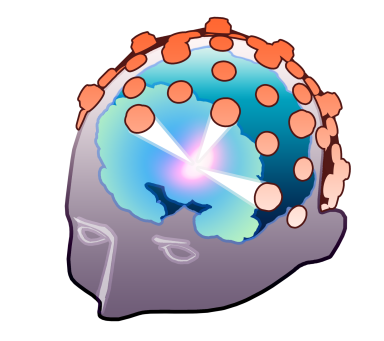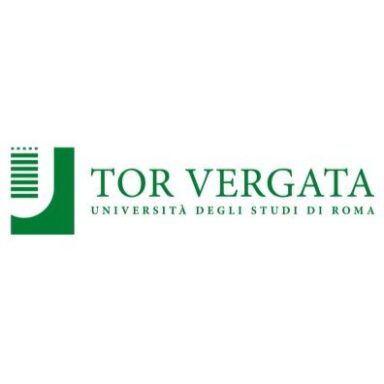AEGEUS
A Novel EEG Ultrasound Device
for Functional Brain Imaging
and Neurostimulation
Partners
The Fraunhofer-Gesellschaft, based in Germany, is the world’s leading applied research organization. It currently operates 76 institutes and research units throughout Germany with around 30,800 employees.
The Fraunhofer Institute for Digital Medicine MEVIS is one of the leading global research and development centers for computer assistance in image-based medicine. Key competences are imaging, quantitative image analysis and visualization, modelling and simulation, our experience engineering as well as interface and workflow design, computer aided training, and medical workstation design. Fraunhofer MEVIS develops solutions for clinically relevant problems. One of the core research activities is directed towards planning, risk analysis, and interventional support for minimally invasive and image guided therapies. MEVIS has a multidisciplinary staff of more than 90 computer scientists, physicists, mathematicians, engineers, and medical doctors. Research and development are performed in close collaboration with more than 150 clinical scientific and industrial partners worldwide.
In the AEGEUS project, the Imaging Physics group at Fraunhofer MEVIS is responsible for research and development. The group led by Prof. Matthias Günther, has been developing new methods in magnetic resonance (MR) and ultrasound (US) imaging for many years. One focus is on physiological imaging with techniques like arterial spin labelling. Research and development activities include MR sequence development, US and MR-image reconstruction along mathematic simulation and modelling. Also, the therapeutic use of ultrasound and therapy guidance are central research topics.
The Fraunhofer Institute for Biomedical Engineering IBMT, founded in 1992, is one of the 76 institutes and research units of the Fraunhofer-Gesellschaft. The Fraunhofer-Gesellschaft based in Germany is the world’s leading applied research organization. Prioritizing key future-relevant technologies and commercializing its findings in business and industry, it plays a major role in the innovation process. It is a trailblazer and trendsetter in innovative developments and research excellence. It supports research and industry with inspiring ideas and sustainable scientific and technological solutions and is helping shape our society and our future. Fraunhofer IBMT´s 160 motivated employees generated the total Fraunhofer IBMT budget, consisting of the operational and capital budget, amounted to € 17,5 million in 2022. Located at four sites in Germany (Sulzbach/Saarland, Würzburg/Bavaria, Münster/North Rhine-Westfalia and Berlin), Fraunhofer IBMT acts as a device and technology developer when it comes to the solution of individual research and development projects and tasks from the areas of biomedical/medical engineering, medical biotechnology, bioprocessing & bioanalytics, cryo(bio)technology and nano(bio)technology, ultrasound technology, biomedical microsystems, neuroprosthetics and implants, health information systems, theranostics, (mobile) laboratory technology as well as laboratory automation including in-line/on-line process control.
For more than 10 years, Fraunhofer IBMT has been working in the field of stem cell research and hosting extensive cell line stocks in industrial and clinically structured biobanks for low temperature storage of valuable samples (fluids, cells, tissue fragments). With more than 40 members of staff, IBMT´s Ultrasound Department is one of Europe´s largest R&D facilities in the field of ultrasound technology and spans the whole range of expertise from simulation and feasibility studies, transducer and system engineering up to signal processing and manufacturing technology (incl. ISO 9001/13485 certification). In AEGEUS, IBMT´s Ultrasound Department will contribute by developing a new theranostic system for epilepsy management based on a combination of therapy and sensing ultrasound transducers driven by a multichannel device.
MEDIRI is a German Imaging CRO founded in 2004 as “medical imaging research institute”.
MEDIRI has expertise in medical image processing and image data management, MR sequence development and the simulation and biophysical modelling of ultrasound data. DL approaches are used for segmentation and quality analysis of image data. MEDIRI’s quality management system is compliant to ISO IEC 13485. The company also has translational know-how, generating license revenues for MRI sequence developments. Relevant patents exist in the fields of ultrasound, MRI sequence development and image data management.
MEDIRI offers medical imaging and automated image processing services for clinical studies to pharmaceutical companies, CROs and clinics, based on its in-house developed image data management platform mTRIAL. This web-platform is designed for secure hosting of medical (image) data with role specific access rights for all stakeholders of a clinical study and enables real-time control of study activities. It covers the complete workflow from pseudonymized upload and image quality assessments to central read and will guarantee GDPR-compliant data transfer between consortium partners for the clinical studies planned in AEGEUS.
Gemeinnützige Salzburger Landeskliniken Betriebsgesellschaft
The Charitable University Hospitals Salzburg ltd. (SALK) were founded in 2004 as a cooperative union of independent hospitals and medical centres. They now comprise of six locations within the region, providing highly specialised medical care to the province of Salzburg and beyond. In close collaboration with the Paracelsus Medical University Salzburg, SALK has also established itself as a high-quality research institution within the region.
The Department of Neurology, based in the Christian-Doppler University Hospital, is part of a European Reference Network for the treatment and care of patients with rare diseases (EpiCARE). Hence, the department is highly specialised on the care of rare and complex epilepsies, besides other neurological conditions, such as stroke, neurodegenerative diseases and disorders of consciousness. Within the SALK, the Department of Neurology is one of the key research departments, often awarded with prizes for excellent research activities in Salzburg.
In collaboration with the faculty of natural sciences of the Paris-Lodron University in Salzburg, the Department of Neurology has established the Centre for Cognitive Neuroscience in Salzburg, partaking in a plethora of international and national research projects in both medical and cognitive neuroscience.
Universitätsklinik für Neurologie, neurologische Intensivmedizin und Neurorehabilitation
Universitätsklinik für Neurologie, neurologische Intensivmedizin und Neurorehabilitation/AEGEUS
Centre for Cognitive Neuroscience (University of Salzburg)
Universita Degli Studi Di Roma Tor Vergata
The University of Rome Tor Vergata (UNITOV) is a young, medium-sized (40,000 students and over 2,000 staff members)
research-oriented university in southeastern Rome, a 600-hectare campus. UNITOV comprises six schools, including Medicine and
Surgery and its Hospital: Policlinico Tor Vergata (COVID-4 Hospital). In the 2011-2020 ten-year period, the University developed 4,785 international collaborations on all five continents, with 25,572 coauthored publications, demonstrating its full international character. UNITOV has been classified among the most successful young universities by Nature-based on its activity in attracting talent and levelling up through research results and high-quality international collaborations. Over the years 2016-2021, UNITOV has activated 163 exchanges of structured personnel with foreign universities (funded project initiatives or international cooperation initiatives and/or visiting professors and/or staff exchange initiatives). In AEGEUS The Medical Physics Section at UNITOV contributes specific expertise on modality data fusion, physiological systems modeling, Physically Informed Neural Networks and AI-based inference.
Universita Degli Studi Di Roma La Sapienza
Founded in 1303, Sapienza University of Rome is one of the oldest and most prestigious universities in the world and the largest in Europe, with 115,000 students, 6,000 professors and 4,000 staff. It is highly ranked in international university ratings such as the QS World University Ranking. It offers 287 bachelor's and master's degrees, 84 specialization schools, 85 doctoral programs and 194 master's programs. Sapienza emphasizes digitalization and innovation in healthcare, with programs like the High Technology Degree in Medicine and Surgery, and initiatives like the Sapienza Information-Based Technology Innovation Center for Health (STITCH), which focuses on neuroengineering, e-health, biosensors, big data analysis, AI, medical robotics, and network medicine.
The Laboratory of Biomedical Engineering and Bioinformatics in the Department of Computer, Control, and Management Engineering conducts multidisciplinary research focused on neurophysiology, neurorehabilitation, and -omics data analysis. The group's main research areas include advanced computational techniques for analyzing and interpreting electrical signals recorded from the brain, and the development of neurocomputational brain models aimed at understanding the underlying dynamics of brain activity and connectivity. Other areas of expertise include neuroelectrical hyperscanning and social neuroscience, design and validation of EEG-based brain-computer interfaces for assistive and rehabilitation purposes, modeling and analysis of -omics data for precision and network medicine, and bioinformatics.
https://www.uniroma1.it/en/pagina-strutturale/home
https://www.diag.uniroma1.it/en
The University of Akureyri (UNAK) was founded in 1987. UNAK is a higher education institution with about 200 employees and about 2500 students. As a public institution, its aims are non-for profit and the main activities lie in teaching and research. It is organized into the school of Humanities and Social Sciences and the school of Health, Business and Natural Sciences, where the respective Faculties offer study lines on Bachelor, Master, and PhD level.
The Brain and Cognition Lab is a laboratory within the Faculty of Psychology at the University of Akureyri and it is the structure within which the AEGEUS project will be implemented. The lab is equipped with a 32-channel EEG system and eye-tracking facilities. It also includes computing facilities for processing our research data, and for computational modelling. Current research topics in the lab include, for example, visual attention and memory, emotional arousal biases of attention, synesthesia, retrieval effects of memory, short term memory architecture, EEG studies in neurological and psychiatric conditions, and reliability of quantitative EEG.
https://www.unak.is/english/research/research-projects/research-in-the-faculty-of-psychology
https://www.unak.is/english/research/research-projects/aegeus
G.tec Medical Engineering Gmbh
G.tec medical engineering GmbH (GTEC) is a thriving Austrian SME with about 35 employees. GTEC makes and sells hardware, software, and complete systems to collect and analyse EEG from people. GTEC is also active in several current collaborative funded projects and has successfully completed over 20 such projects. GTEC was founded in 2004 and has had the same main technical proficiencies since its foundation: design, manufacturing, testing and certification of tools to collect and analyse human biosignals.
Wir benötigen Ihre Zustimmung zum Laden der Übersetzungen
Wir nutzen einen Drittanbieter-Service, um den Inhalt der Website zu übersetzen, der möglicherweise Daten über Ihre Aktivitäten sammelt. Bitte überprüfen Sie die Details in der Datenschutzerklärung und akzeptieren Sie den Dienst, um die Übersetzungen zu sehen.








